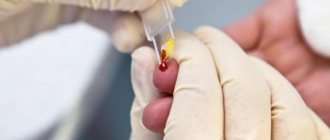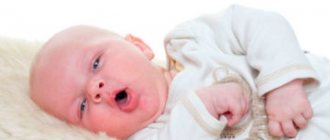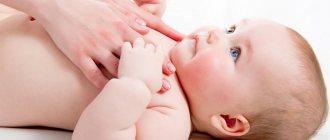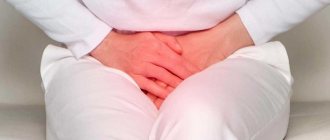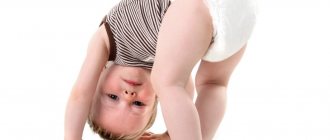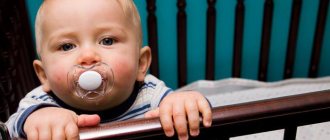Sweating is a natural physiological state of the body, regardless of age. Cold sweat in a child may be a normal reaction: the child is overheated or overly excited. But if a child often sweats for no apparent reason, then this may signal various diseases. In this case, you need to take a closer look at the baby’s condition: when he sweats (during sleep or at rest), how often, and whether there are additional symptoms. Then you should seek help from a doctor.
Pathological causes
If your child develops frequent cold sweats, you should contact your pediatrician. First of all, serious diseases that cause this symptom should be excluded. Excessive sweating is characteristic of the following diseases:
- Malfunctions in the functioning of the endocrine system - if there is a problem with the thyroid gland, the baby sweats a lot. Hyperhidrosis is usually accompanied by an unpleasant ammonia odor. Additional symptoms include: shuddering during sleep, sudden weight loss or gain with a normal diet.
- Disorders of the nervous system - in this case, the baby develops cold and sticky sweat. Hyperhidrosis occurs in different areas of the body. The child is also capricious and cries, is constantly in an irritated state, and has frequent tantrums. Night sleep is restless.
- Rickets - this disease is usually caused by a lack of vitamin D in the body. Rickets is distinguished by vivid symptoms - a lag in mental and physical abilities, a receding hairline appears on the head due to constant hair loss, the appearance of a hump, poor appetite. The child sweats a lot at night and often has to be changed.
- Diseases of the heart muscle and the entire cardiovascular system - in addition to sweating, the child does not feel well. He is lethargic and inactive, rarely plays with his peers, and wants to sleep constantly.
- Disease of the respiratory system – in pathological processes (pneumonia, bronchitis, tuberculosis), the baby’s sweating increases. He also suffers from a severe cough.
- Infection with helminths. If your baby coughs for no reason, grinds his teeth at night, often sweats and puts his fingers in his mouth, he probably has worms.
- Acute viral or bacterial infections - in these situations, increased body temperature, runny nose, sore and sore throat, and general weakness are additionally diagnosed. The child may cough with either a dry or wet cough.
Attention! If you experience cold sweat, do not panic. Take a closer look at the baby's condition. Any serious illness will have other symptoms.
Diagnostics
What diagnostic measures are required depends on the general health of the child.
The doctor will tell you how to properly care for your child’s skin.
He may be assigned:
- vitamin D test;
- blood analysis;
- urine test;
- glucose tolerance test;
- Ultrasound of the brain and thyroid gland;
- cardiogram.
External factors
Young children are very sensitive to changes in environment, humidity and air temperature. Sweating is also affected by
other irritants (for example: overexcitation). Any changes lead to the appearance of cold sweat in babies. The main external causes of cold sweat include the following:
- Dry and warm air in the room - the optimal air temperature in the room is 20 degrees. At high levels, active babies begin to sweat a lot.
- A bed that is too warm and soft - sleeping on down mattresses and under two blankets leads to the baby sweating a lot during sleep;
- Wrapping up a child - if you dress the baby too warmly, this will lead to a disruption in heat exchange. A child develops cold sweat on his body and forehead during games or active walks.
Sweating due to external factors is safe for the child's health. When third-party causes are eliminated, the child’s increased sweating goes away.
What parents should do
Oxalates in the urine of a child under one year of age—causes of occurrence, calcium levels
If your baby has cold sweats at night, it is possible that the apartment is too hot (this often happens in the summer). In this case, you should regularly ventilate the room, especially before putting the baby to sleep at night. It is also necessary to walk with your baby as often as possible. You need to wear clothes for a walk so that outside, if necessary, you can easily remove an additional layer if it gets warmer, and put it on again if it gets colder. In the hot summer, you can wear only a bodysuit for your baby and cover the baby with one flannel diaper.
When to see a doctor
If your child constantly has a wet and cold forehead, you should consult your local pediatrician. The doctor will send the baby for tests and do an ultrasound of the thyroid gland, because excessive sweating is often caused by hormonal disorders.
The child will also be tested for the Mantoux test to rule out tuberculosis. If sweating occurs along with other symptoms of rickets, the baby will be prescribed a course of vitamin D. In each case, treatment is determined individually.
Sometimes sweating is caused by a metabolic disorder
Attention! If excessive sweating is combined with a low temperature, the child is likely not getting enough nutrition. In this case, it is necessary to weigh the baby regularly and, if necessary, add formula or complementary foods to breastfeeding.
When emergency help is required
In some cases, if you notice cold sweat in a baby, you should immediately consult a doctor or call an ambulance. These include:
- temperature above 38 degrees;
- sweating combined with symptoms of a gastrointestinal infection or food poisoning;
- clear signs of dehydration (for example, sunken fontanel);
- general poor health of the child, for example, drowsiness, lethargy and lethargy.
Important! Excessive sweating is also a side effect of some vaccines and cold remedies. In this case, this condition goes away on its own, without requiring treatment, after stopping the drug.
Cold sweat in a child during sleep
Often a child sweats while sleeping. But sometimes this is a normal symptom, since the baby’s body has the following features:
- Thermoregulation may be unstable because the sweat glands are not yet fully formed;
- There are more sweat glands on the skin of children than on the same area in adults;
- The child sleeps longer in the deep phase.
Sweating during sleep can be caused by illness or external factors. Also, if your baby sweats at night, this may indicate the following:
- Prolonged stay in a stressful state;
- Development of infectious processes (for example: the initial stage of ARVI);
- Excess body weight in a baby;
- Cold sweat during sleep can persist for a long time even after illness;
- Side effect after taking strong medications;
- Vivid impressions received during the day (these can be both positive impressions and negative ones: fright or fear).
Attention! Overeating before bed can lead to night sweats. Especially when it comes to spicy, hot or spicy dishes.
Features of sweating in children
First, take a closer look at your child - are you monitoring his temperature correctly? Sweating is normal; this is how the body gets rid of toxins, unnecessary substances, or simply excess fluid. Sweat glands are the same part of the excretory system and play a very important role. For normal growth and healthy development, the process of sweating is necessary and very important.
You've probably heard that you can't wrap up a child. Even if it seems to you that it is very cold outside, and the wind only adds danger to your baby’s health, think twice before dressing him inappropriately for the weather. An excess of warm clothing on a child is much more dangerous than a lack of it, because many layers of dense fabric simply do not allow heat exchange (in which sweating takes an active part) to occur correctly.
All these attempts to protect a child from a cold lead to diseases that are more difficult to get rid of. The consequence of such diseases can be cold sweat that appears in the baby along with other symptoms or separately. Children sweat quite often, so cold sweat may go unnoticed at first. Be careful and don't panic - try to find out what is causing the symptom, and only then act.
Overheating also increases the risk of ARVI because it creates hothouse conditions for the baby’s immune system. The harm of this approach to health is comparable to attempts to disinfect all surfaces that a child comes into contact with - the body will weaken and lose the ability to fight a real threat. Sweating will simply make the skin damp, cooling it and causing a temperature difference between inside and outside. A child doesn’t even have to take off sweaty clothes in the cold to catch a cold - cold air can easily get under clothes when moving.
If your child has cold sweats and a low temperature
Sometimes, with increased sweating, the temperature begins to drop. In this case, you need to cover the child with a blanket and ventilate the room, you also need to give the baby hot tea and, if necessary, change clothes (if they are wet). If the condition continues to worsen, despite all measures, the baby has cold hands and body, he does not feel well, you should call an ambulance.
This condition (the child has a temperature of 35) may indicate viral diseases or side effects of antipyretics or vasoconstrictors.
Why do babies get sweaty heads?
An unpleasant feature of many premature babies, as well as those born with low birth weight (less than 2800 grams), is that they are susceptible to rickets. It is because of this disease that an infant’s head can often sweat. The disease is staged: there is an acute form and a subacute course.
In addition to premature babies, the risk group includes those who are slowly gaining weight or are bottle-fed. In addition, “winter” babies suffer from rickets more often than those born in the summer. The first ones simply do not have enough “sunshine” vitamin D. Often, even taking vitamin complexes is not able to compensate for such a deficiency.
In November, December and February, children suffering from rickets experience a seasonal exacerbation. Then the symptoms of the disease manifest themselves most strongly.
Signs of rickets include:
- Sweating at the back of the head
- Baldness in the area on the head where sweat appears
- Poor appetite
- Unreasonable crying for 2-3 (in this case you need to call an ambulance)
- Poor sleep, which may be accompanied by sobs, groans, and involuntary muscle contractions
- Increased activity or, conversely, constant lethargy
If any of the above symptoms occur, you should immediately seek help from your pediatrician. It is he who will confirm or refute the diagnosis of rickets and prescribe the appropriate treatment.
Attention! You should not delay or interrupt treatment for rickets. This disease is rich in complications and “gifts”. As its “presentation,” the child may develop: flat feet, club feet, delayed teeth, unfounded caries, convulsions, bleeding gums and a number of other endocrine and neurological pathologies.
Excessive sweating is the scourge of many people. However, not everyone understands that this feature of the body often hides something more serious, for example, a disease. If an infant is sweating, you should immediately go to your local doctor. Only after taking it can you be calm about the baby’s health.
When you need a doctor's help
Sometimes the child suddenly breaks into a cold sweat, and other symptoms appear along with this. Doctor's help is necessary in the following cases:
- The child’s body temperature rapidly increases or decreases;
- Additionally, nausea, vomiting, headache, or the child has a stomach ache are diagnosed;
- The appearance of a rash on the skin;
- The baby has increased tearfulness, and there may be pus from the eyes.
If the baby’s condition worsens, then it is necessary to call an ambulance and follow the doctor’s advice.
Sweating: pathology and norm
Red dots around the eyes of a child - possible causes of the rash
If your child has cold sweats while sleeping, you should monitor how he feels during the day. If the situation does not change during the day, it is recommended to measure the temperature; it may be elevated. Parents should pay attention to the following points:
- how the child sleeps: calmly or often wakes up;
- Is the baby growing well and gaining weight?
- whether the child has delayed physical development;
- Are urine and blood tests normal?
You should also pay attention to the child's nutrition. Sweating is likely caused by a lack of nutrients in the body, as well as problems with the absorption of vitamin D.
Cold sweat in a child under one year old
Sweating in infants is not yet fully developed. Cold sweat may indicate serious diseases of the endocrine or nervous system. Therefore, the baby should be shown to a pediatrician, he will send the baby for a full examination.
You should immediately consult a doctor if profuse sweating in newborns is accompanied by the following symptoms:
- The child starts in his sleep;
- The baby sweats even when at rest;
- Cold and sticky sweat in a small child, like paste.
Cold sweat may also occur after vaccinations. This is the body's reaction to vaccination. Sweating can also be caused by teething in infants.
Attention! If a child's head sweats a lot, this indicates possible malfunctions in the nervous system or vitamin D deficiency.
When should you see a doctor?
In some cases, the problem is caused by dangerous reasons. In this situation, profuse sweating will be one of the additional symptoms of disease. But in each specific case there are leading signs.
Serious causes of cold sweat in a child:
- disturbances in the functioning of the endocrine gland - in addition to cold perspiration, the baby will sharply lose or gain weight, but its diet does not change. The baby also shudders during sleep and smells of ammonia.
- viral infections - a standard set of symptoms includes high body temperature, cough, runny nose, sometimes vomiting and diarrhea, general weakness, irritability, aching joints.
Signs of rickets in children.
Rickets is a disease associated with disorders of the musculoskeletal system, since the body lacks vitamin D. The disease is usually found in northern regions where there is a lack of sunlight. In most cases, it affects premature babies.
- pathologies of the cardiovascular system - during illness the baby will often get tired. He is away from active games. It is impossible to diagnose pathology without an ultrasound of the heart and a cardiogram.
- hypoglycemia – a drop in blood sugar levels. This is a serious condition in which the baby breaks into a cold, sticky sweat; he also experiences clouding of consciousness, weakness, and dizziness. Hypoglycemia progresses to coma.
- a sharp drop in blood pressure - usually occurs with allergic reactions to irritants.
- hypoxia – with an acute lack of oxygen, both children and adults begin to sweat profusely.
What to do if your child has cold sweats
There are a number of simple preventive measures that will help you avoid excessive sweating. But they are effective if hyperhidrosis is caused by external factors. In case of illness, complex treatment is necessary.
- Maintain an optimal air temperature (20 degrees) in the child’s room, ventilate the room often.
- Dress your child based on weather conditions. You should not overheat your baby by putting several blouses and hats on him.
- Eliminate from your diet foods that stimulate the sweat glands. Undesirable foods include: spicy foods, spices, smoked foods, sweet carbonated water, etc.
- Change bedding - give preference to orthopedic hard mattresses, change warm cotton blankets to lighter ones.
- Don't forget about walks in the fresh air; if possible, walk for 15-20 minutes before bed.
Sweating as a symptom of emergency conditions
As mentioned above, the factors that provoke sweating can be completely non-life-threatening conditions. But it also happens that you need to react quickly and clearly.
Of course, cold sweat in itself is not terrible, but in combination with other symptoms it indicates the following serious health problems:
- hypoglycemia is a sharp drop in blood glucose levels. This condition occurs not only in diabetes mellitus, but in healthy children;
- sudden hypotension – a decrease in blood pressure due to severe allergic reactions, infections, etc.;
- acute hypoxia – lack of oxygen in the body. Occurs as a result of poisoning, asphyxia, severe lung diseases, etc.;
- shock – its causes are varied. There are several types of shock - anaphylactic, cardiogenic, hypovolemic, septic and neurogenic. The bottom line is that the blood supply to organs and tissues is sharply disrupted.
And more common reasons:
- seasickness (motion sickness);
- repeated vomiting;
- vasovagal reaction;
- severe pain, etc.
